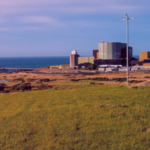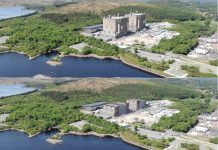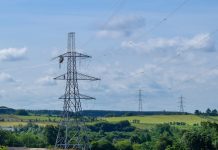 Hitachi has shelved plans to build a new nuclear power plant in Anglesea, North Wales. The company said it would post an estimated 300 billion yen (£2.14bn) impairment loss as a result, plus 300 billion in other related losses.
Hitachi has shelved plans to build a new nuclear power plant in Anglesea, North Wales. The company said it would post an estimated 300 billion yen (£2.14bn) impairment loss as a result, plus 300 billion in other related losses.
Hitachi said it hoped to continue discussing a nuclear power programme with the UK government, but had not been able to agree financial and commercial terms for Wylfa.
The firm acquired the Horizon Nuclear Power programme from Eon and RWE in 2012 for £697m. It had planned to build advanced boiling water reactors (ABWRs) at Wylfa and at a second site at Oldbury on Severn, South Gloucestershire.
Hitachi president and CEO, Toshiaki Higashihari, said it had decided to “suspend the Horizon Project from the viewpoint of its economic rationality as a private enterprise”. He added it was “clear that more time is needed to develop a financial structure”.
Duncan Hawthorne, CEO of Horizon Nuclear Power, added that he was “sorry” the UK and Japanese governments, as well as Hitachi, had failed to reach agreement on terms.
“As a result we will be suspending the development of the Wylfa Newydd project, as well as work related to Oldbury, until a solution can be found. In the meantime we will take steps to reduce our presence but keep the option to resume development in future,” he said.
Hitachi follows Toshiba in halting plans to build new nuclear power stations in the UK.
Some industry commentators suggested the government has been sidetracked by Brexit and is putting at risk carbon budgets and targets, as well as its ability to keep the lights on without reliance on more carbon intensive forms of generation.
But energy secretary Greg Clark told the Commons that power project economics had changed in recent years, with costs of renewable generation falling. “This positive trend has not been true when it comes to new nuclear,” said Clark.
“Across the world … the cost of most new nuclear projects has increased as the costs of alternatives has fallen,” he added, with investors looking at quicker, less capital intensive and less risky projects.
However, Clark said the government “continues to believe” a diverse range of generation sources will be needed to maintain security of supply at lowest cost, “and new nuclear has an important role in our future energy mix”.
Of Wylfa, Clark said government had been “willing to consider taking a one third equity stake in the project,” and had been “prepared to provide all of the required debt financing to complete construction”. He said government was also prepared to pay a strike price of up to £75/MWh.
New ways of financing nuclear power stations will likely be required to build any new nuclear power stations, said Clark, with his department to report on the regulated asset base model by summer.
See the Hitachi’s statements here and here.
See Horizon’s statement here.
Watch the energy secretary below from around 11.52:
Related stories:
Toshiba shuts down UK new nuclear plan
Follow us at @EnergystMedia. For regular bulletins, sign up for the free newsletter.




The switch from fossil fuel powered transport is accelerating spearheaded by electric only vehicles that will probably be eventually replaced by hydrogen electric, however the production of electricity in the UK is already near its limit to meet demand and not enough to meet this rising demand for electric transport, so it is vital that our generating capacity is significantly increased over the next decade and a disappointment that now Hitachi has pulled out of its nuclear electricity generation in the UK. I suspect that a major part of their decision to withdraw, is due to the requirement to commit to the cost of decommissioning of their nuclear power stations at the end of their life. It it reasonable to ask companies building a nuclear power plant to commit to such a large long-term, and unknown cost?